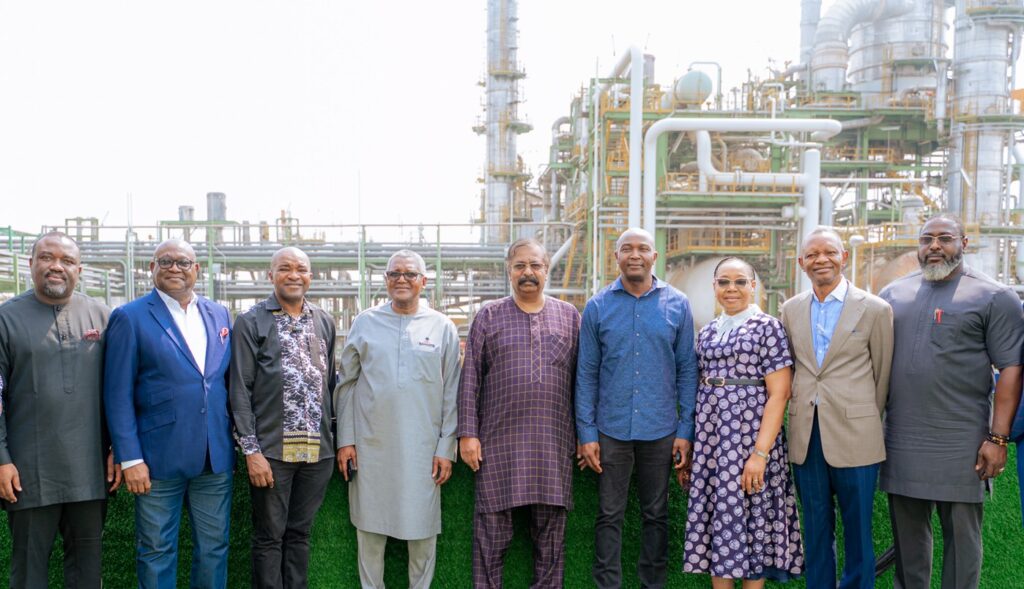Daud Olatunji
The Dangote Petroleum Refinery says it has exported two cargoes of jet fuel to Saudi Aramco, the world’s largest oil producer.
PLATFORM TIMES reports that a statement was issued from the Dangote Group of company on Wednesday, disclosing this latest step by the company.
Speaking on Tuesday during a visit by the Nigerian Economic Summit Group (NESG) delegation to the Dangote Fertiliser Limited and the Dangote Petroleum Refinery & Petrochemicals in Ibeju Lekki, Lagos, Dangote Group President Aliko Dangote declared, “We are reaching the ambitious goals we set for ourselves, and I’m pleased to announce that we’ve just sold two cargoes of jet fuel to Saudi Aramco.”
PLATFORM TIMES reports that since production began in 2024, the refinery has steadily ramped up its capacity, now hitting an impressive 550,000 barrels per day.
Dangote added that this performance not only cements its reputation as a major player in the oil refining sector but also marks Nigeria’s transition from a net importer to a net exporter of petroleum products.
He stated further that the achievement is particularly significant given that Saudi Aramco is a majority state-owned giant known for its integrated operations across the oil and gas spectrum.
Exporting to such a prestigious client is a clear endorsement of the refinery’s adherence to international benchmarks.
Dangote’s announcement comes on the heels of the construction of the $20 billion refinery – the largest single-train facility in the world – which many see as a cornerstone in Nigeria’s industrial renaissance.
NESG Chairman, Mr. Niyi Yusuf, did not mince words when he lauded the scale of Dangote’s investments.
“To achieve a $1 trillion economy, much of that must come from domestic investments,” Yusuf noted.
He added, “I joked during the bus ride that while others are dredging to create islands for leisure, you’ve dredged 65 million cubic tonnes of sand to create a future for the country.
“This refinery, fertiliser plant, petrochemical complex, and supporting infrastructure are monumental.”
Yusuf was emphatic about the role of homegrown industries in Nigeria’s future. “It’s inconceivable that a nation of over 230 million people, with an annual birth rate higher than the total population of some countries, is still dependent on imports to feed its citizens,” he stressed.
He continued, “The NESG is grateful, and I believe the nation is as well. This refinery represents the audacity of courage. It takes immense effort to do what you’ve done and still be standing and smiling.
“Thank you for inspiring us and showing that nothing is impossible.”
Dangote, in his measured response, reiterated the importance of the private sector in driving national development
He cautioned that the free market should not become a pretext for perpetual import dependence.
Drawing parallels with other nations, he cited the example of the Benin Republic, which restricts cement imports to protect its local industries—even though his Ibese plant is a mere 28km away from the border.
“The government stands to gain substantially when the private sector flourishes. For instance, 52 kobo of every naira generated by Dangote Cement goes directly to the government,” he added.
However, Dangote was quick to highlight the enormous challenges inherent in setting up such large-scale operations in Nigeria.
Do you want to share a story with us? Do you want to advertise with us? Do you need publicity for a product, service, or event? Contact us on WhatsApp +2348183319097 Email: platformtimes@gmail.com
We are committed to impactful investigative journalism for human interest and social justice. Your donation will help us tell more stories. Kindly donate any amount HERE


